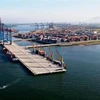
Rome (VNA) – Vietnam is set to lead Southeast Asia’s e-commerce revolution, given that this industry potentially drives national economic transformation, according to the latest report published by IMARC Group, a market research provider, on December 1.
The report said the global e-commerce market size is valued at 26.8 trillion USD in 2024 and is projected to reach 214.5 trillion USD by 2033. From established giants in the US and Europe to fast-paced markets in Asia, the e-commerce revolution is creating a competitive marketplace that transcends geographical boundaries.
With favourable regulatory conditions, expanding foreign investments, and enhanced internet accessibility, Vietnam’s e-commerce ecosystem is poised to witness sustained expansion, transforming it into a regional powerhouse in the digital economy. E-commerce accounts for over 60% of Vietnam’s digital economy, while a significant chunk of the remaining 40% share is captured by ride-hailing and online media. In addition, the country’s digital economy is estimated to reach 220 billion USD by 2030, portraying ample opportunities for global investors. Projections indicate that Ho Chi Minh City and Hanoi will develop to become significant hubs, it said.
Vietnam is also recognised as one of the most conducive legal environments for e-commerce in the ASEAN. According to a survey by Facebook and Bain & Company, Vietnam is forecast to surpass the other ASEAN nations and become the fastest-growing e-commerce market in the region by 2026.
The Vietnamese Government is encouraging a cashless environment to limit cash transactions to below 10% of total payments. It has recently approved a national e-commerce growth master plan in line with Fourth Industrial Revolution strategies. The plan is aimed at establishing a digital economy driving national digital transformation.
According to the International Monetary Fund (IMF), Vietnam is projected to rank third in Southeast Asia in terms of GDP by 2025 with 571.12 billion USD, after Indonesia (1.63 trillion USD) and Thailand (632.45 billion USD). Also, Vietnam’s economy is predicted to surpass Thailand’s after 2028. This trend is projected to significantly augment Vietnam’s e-commerce industry growth by increasing buyer spending power, attracting larger foreign investments, and reinforcing the country’s position as a regional digital economy leader.
As per IMARC estimates, Vietnam’s e-commerce industry is projected to exhibit a compound annual growth rate of 28% from 2025-2033. Its progressing e-commerce landscape is characterised by successful local platforms including Tiki, Sendo, and Thegioididong, driven by investments from Japan, the US, Germany, China, the Republic of Korea (RoK), and Singapore.
Singapore, a regional economic hub, is connected closely to Vietnam’s e-commerce market via companies such as Shopee and Carousell. Singapore-based investors, including Temasek, GIC, and others have funded Vietnamese e-commerce startups.
The RoK, with its robust technological capabilities and increasing interest in Southeast Asia, is increasingly targeting Vietnam’s e-commerce arena. Korean e-commerce platform Coupang is exploring potential entry into the Vietnamese industry, harnessing its expertise in logistics and tech-driven solutions. In addition, Korean conglomerates such as Samsung and LG are investing in e-commerce infrastructure to promote their electronic products in Vietnam.
The report highlighted seven factors behind Vietnam’s appeal to the world, including high growth potential driven by a young and tech-savvy population, favourable Government policies, increasing foreign direct investment, and a strong export-focused economy; favourable investment climate such as relaxed foreign investment regulations, tax incentives, reduced tax rates, flexible labour policies, improved labour relations, support for public-private partnerships, and other policies to create a business-friendly environment.
Others include Vietnam’s strategic location that makes it an exemplary gateway to other regional markets, Government support for digital transformation, entry into free trade agreements such as the Comprehensive and Progressive Agreement for Trans-Pacific Partnership (CPTPP) and the Regional Comprehensive Economic Partnership (RCEP), and a young and skilled workforce that is well-versed in technology and can adapt to the demands of the e-commerce industry./.






















